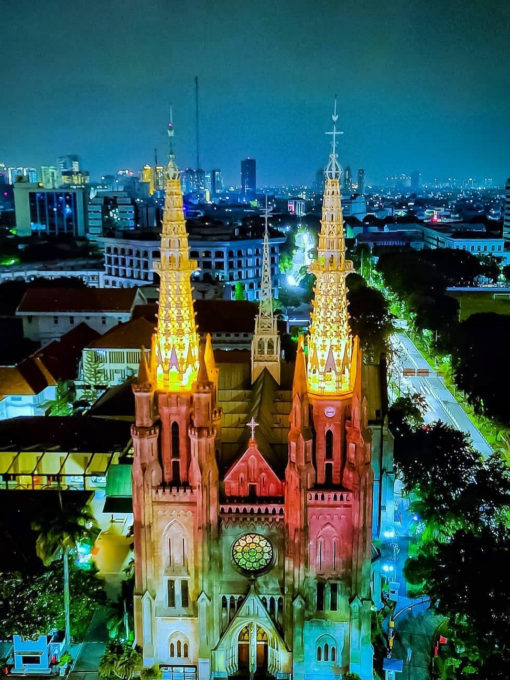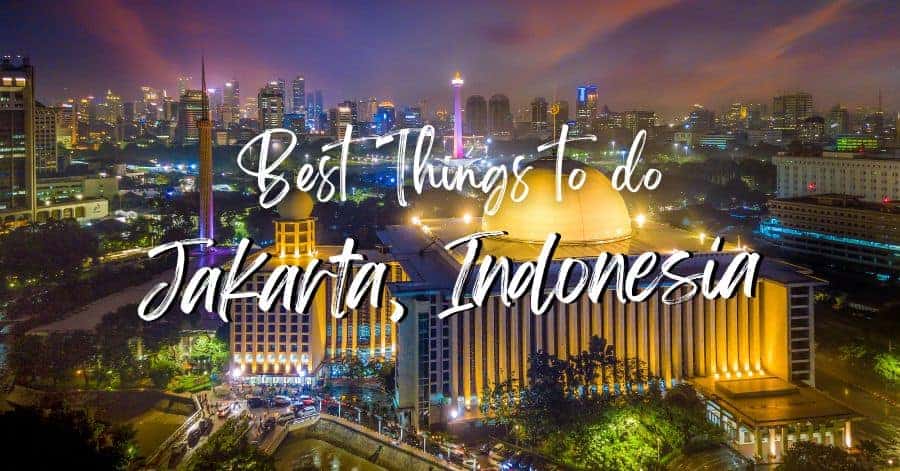
Jakarta, the sprawling capital of Indonesia, is a city of immense scale and captivating contrasts. It’s a place where gleaming skyscrapers cast shadows on historic districts, where the aroma of street food mingles with the scent of jasmine from ancient temples, and where the echoes of colonial history resonate amidst the relentless hum of modern life. More than just a gateway to the Indonesian archipelago, Jakarta is a destination in its own right, offering a vibrant tapestry of experiences for intrepid travellers willing to delve beneath the surface.
This bustling metropolis, home to over 10 million people, can be overwhelming at first glance. However, with a little planning and a sense of adventure, Jakarta reveals its unique charm, offering a glimpse into Indonesia’s rich history, diverse culture, and burgeoning future. This guide will help you navigate the city, uncovering its top attractions, sharing essential travel tips, and providing insights into accommodation, transportation, and the best time to visit.
Top Attractions: A Journey Through History and Culture

Related Articles about Jakarta: A Metropolis of Contrasts – Exploring Indonesia’s Vibrant Capital:
- Spain: A Tapestry of Sun, Soul, and Unforgettable Adventures
- Romania: A Timeless Journey Through Castles, Mountains, and Ancient Traditions
- The Land of the Long White Cloud: Your Ultimate Travel Guide to New Zealand
- Osaka: A Culinary Capital and Cultural Crossroads
- Jakarta: A Traveler’s Guide to the Bustling Capital of Indonesia
Jakarta’s attractions are as diverse as its population, ranging from historical landmarks and museums to bustling markets and modern entertainment complexes. Here’s a curated list to get you started:
-
Kota Tua (Old Town): Step back in time in Kota Tua, Jakarta’s historic district. Once the heart of Dutch colonial power, this area is a treasure trove of well-preserved buildings, cobbled streets, and historical museums. Key attractions include:
- Fatahillah Square: The central square of Kota Tua, surrounded by iconic buildings like the Jakarta History Museum (Museum Fatahillah), the Wayang Museum (Puppet Museum), and the Bank Indonesia Museum.
- Jakarta History Museum (Museum Fatahillah): Housed in the former Stadthuis (City Hall), this museum chronicles Jakarta’s history from prehistoric times to the present day.
- Wayang Museum (Puppet Museum): A fascinating collection of traditional Indonesian puppets, including wayang kulit (shadow puppets) and wayang golek (wooden puppets).
- Cafe Batavia: A legendary cafe housed in a beautifully restored colonial building, offering a glimpse into the past with its vintage decor and traditional Indonesian cuisine.
- Toko Merah (Red Shop): A striking red-brick building, one of the oldest in Jakarta, which once served as a residence and trading post.

-
National Museum of Indonesia (Museum Nasional): Often referred to as the "Elephant Museum" due to the bronze elephant statue in front, this museum boasts an impressive collection of Indonesian artifacts, including prehistoric relics, traditional costumes, ceramics, and ethnographic exhibits. It offers a comprehensive overview of Indonesia’s cultural heritage.
-
Istiqlal Mosque: One of the largest mosques in Southeast Asia, Istiqlal Mosque is a symbol of religious harmony in Indonesia. Its grand architecture and serene atmosphere make it a must-visit, regardless of your religious beliefs. Remember to dress respectfully when visiting.
-
Jakarta Cathedral: Located directly across from Istiqlal Mosque, Jakarta Cathedral stands as a testament to religious tolerance in Indonesia. This neo-Gothic cathedral is a beautiful example of colonial architecture and a significant religious site.
-
Monas (National Monument): Soaring 132 meters into the sky, Monas is Jakarta’s most iconic landmark. At the top of the monument, you can enjoy panoramic views of the city. The base houses a museum depicting Indonesia’s struggle for independence.
-
Taman Mini Indonesia Indah (Beautiful Indonesia Miniature Park): This expansive park showcases the diversity of Indonesia’s 34 provinces, with traditional houses, cultural performances, and regional museums. It’s a great way to experience the richness of Indonesian culture in a single location.
-
Ancol Dreamland: A popular entertainment complex featuring beaches, theme parks, water parks, and a Sea World aquarium. It’s a perfect destination for families and thrill-seekers.
-
Thousand Islands (Kepulauan Seribu): Escape the city bustle and head to the Thousand Islands, a cluster of islands just off the coast of Jakarta. These islands offer pristine beaches, clear waters, and opportunities for snorkelling, diving, and relaxation.
A Brief History of Jakarta: From Sunda Kelapa to the Big Durian
Jakarta’s history is a long and fascinating one, dating back to the 4th century. Here’s a glimpse into its key milestones:
- Sunda Kelapa (4th Century): The area was originally a port city known as Sunda Kelapa, part of the Tarumanagara kingdom.
- Jayakarta (16th Century): In the 16th century, the city was renamed Jayakarta by the Sultanate of Banten.
- Batavia (17th-20th Centuries): In 1619, the Dutch East India Company (VOC) seized control of the city and renamed it Batavia, establishing it as their regional headquarters. Batavia became a major trading center and a symbol of Dutch colonial power.
- Jakarta (1945): Following Indonesia’s declaration of independence in 1945, the city was renamed Jakarta and became the nation’s capital.
- Modern Jakarta: Today, Jakarta is a dynamic and rapidly growing metropolis, grappling with challenges such as traffic congestion and pollution while striving to maintain its cultural identity.
Travel Tips for Navigating the Jakarta Jungle
Jakarta can be a challenging city to navigate, but with these tips, you can make your trip smoother and more enjoyable:
- Transportation: Jakarta’s traffic is notorious. Consider using ride-hailing apps like Gojek and Grab, which are affordable and convenient. TransJakarta, the city’s bus rapid transit system, is another option, but it can be crowded during peak hours. Avoid driving yourself unless you’re comfortable with chaotic traffic conditions.
- Language: Bahasa Indonesia is the official language. While English is spoken in tourist areas and hotels, learning a few basic Indonesian phrases will be greatly appreciated.
- Currency: The Indonesian Rupiah (IDR) is the currency. Credit cards are accepted in larger establishments, but cash is essential for smaller shops and street vendors.
- Bargaining: Bargaining is common in traditional markets and street stalls. Be polite and respectful when negotiating prices.
- Safety: Jakarta is generally safe for tourists, but petty crime can occur. Be aware of your surroundings, especially in crowded areas, and avoid displaying expensive jewelry or electronics.
- Health: Consult your doctor about necessary vaccinations before travelling to Jakarta. Drink bottled water and avoid eating food from questionable sources. Be mindful of the heat and humidity, and stay hydrated.
- Respect Local Customs: Dress modestly when visiting religious sites. Remove your shoes before entering mosques and temples. Be mindful of local customs and traditions.
- Stay Connected: Purchase a local SIM card for easy access to data and communication.
- Embrace the Food: Jakarta is a food lover’s paradise. Be adventurous and try the local delicacies, but be cautious about street food hygiene.
Accommodation Options: From Budget Backpacking to Luxurious Retreats
Jakarta offers a wide range of accommodation options to suit every budget and preference:
- Budget Hostels: For budget-conscious travellers, hostels are a great option. They offer dorm rooms and private rooms at affordable prices. Look for hostels in areas like Kota Tua and Menteng.
- Mid-Range Hotels: Numerous mid-range hotels offer comfortable rooms and convenient amenities. Areas like Thamrin and Kuningan are popular choices for business travellers and tourists.
- Luxury Hotels: Jakarta boasts a number of world-class luxury hotels, offering impeccable service, opulent accommodations, and stunning city views. These hotels are typically located in the central business district.
- Apartment Rentals: For longer stays, consider renting an apartment. Websites like Airbnb offer a variety of apartments in different neighborhoods.
- Guesthouses: Guesthouses offer a more local experience, often run by families and providing a more personal touch.
Getting Around: Navigating the City’s Transportation Network
Jakarta’s transportation network can be challenging, but with a little planning, you can navigate the city effectively:
- Ride-Hailing Apps (Gojek & Grab): The most convenient and affordable way to get around Jakarta. These apps allow you to book motorcycle taxis (ojek), cars, and even food deliveries.
- TransJakarta (Bus Rapid Transit): A dedicated bus lane system that offers a relatively efficient way to travel, but can be crowded during peak hours.
- Commuter Line (KRL Commuterline): A suburban railway system that connects Jakarta with its surrounding areas.
- MRT (Mass Rapid Transit): Jakarta’s first subway line, offering a fast and efficient way to travel along the main corridor.
- Taxis: Taxis are available, but make sure to use reputable companies and insist on using the meter.
- Bajaj: A three-wheeled motorized rickshaw, often used for short distances in certain areas. Negotiate the fare before getting in.
- Walking: While not always the most practical option due to the heat and traffic, walking can be a good way to explore certain areas like Kota Tua.
Best Time to Visit: Weather and Festivals
The best time to visit Jakarta is during the dry season, which runs from May to September. During this period, the weather is generally sunny and less humid, making it more comfortable to explore the city.
- Rainy Season (October to April): Jakarta experiences heavy rainfall during the rainy season, which can cause flooding and disruptions to transportation.
- Festivals: Jakarta hosts a variety of festivals throughout the year. Check the calendar for events that may interest you, such as Jakarta Fair (June-July), Jakarta International Java Jazz Festival (March), and Indonesian Film Festival (November).
Conclusion: Jakarta – An Unforgettable Experience
Jakarta is a city that demands to be explored with an open mind and a willingness to embrace its chaotic charm. From its historical landmarks and cultural attractions to its vibrant street food scene and modern entertainment complexes, Jakarta offers a diverse and unforgettable experience. While it may not be the easiest city to navigate, the rewards for those who venture beyond the surface are immeasurable. So, pack your bags, prepare for an adventure, and get ready to discover the dynamic and captivating metropolis that is Jakarta. You might just find yourself falling in love with the "Big Durian."





